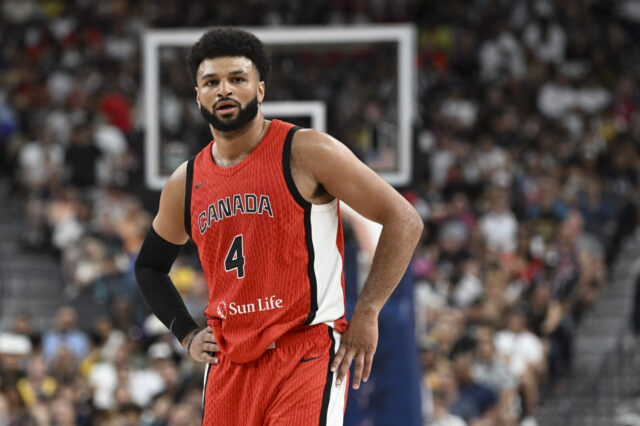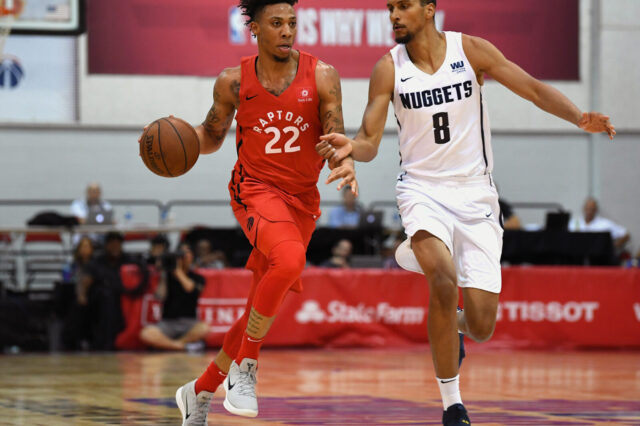There’s an old adage about the NBA playoffs that whichever team has the best player in a series usually wins. Like most aphorisms, it’s not absolute but it’s usually true enough to provide a launch point for predicting how any given series will go.
Nikola Jokic will enter the first playoff series of his career with the expectation that he play like the best player on either team’s roster. He’s not the most decorated or the most accomplished player. That honor would go to multi-time all-stars, Paul Millsap or LaMarcus Aldridge. But fresh off of a season that will likely garner some All-NBA votes and possibly even some MVP votes, Jokic has proven that his best effort lies a cut above all but a small handful of players in the league, none of whom will be suiting up for the Spurs.
Jokic is at the center of everything that the Nuggets do on offense. They have no shortage of talented finishers orbiting around the perimeter and careening toward the basket off of cuts and handoffs. There is shooting and slashing at every position in the starting lineup and off of the bench but Jokic is the team’s best and most reliable creator. When he’s rolling, the team is rolling. When he struggles, the team almost always struggles along with him.
The Spurs will likely mix up their coverage and attempt to keep him from developing a rhythm with any specific, rigid defensive scheme.
“To be honest, I expect everything,” Jokic told reporters on Friday following the team’s final practice before game one of the series. “I expect them to play straight up. I expect them to put maybe small on me and then cover with a big guy. I expect everything.”
Get physical and try to frustrate the hot-tempered phenom?
“I expect that too.”
The four meetings between the Nuggets and Spurs during the regular season each provided a muted look at how the Spurs will attack Jokic defensively since, in each game, there was a key player (or coach) missing. In back to back games in late December, the Nuggets were without Gary Harris, Paul Millsap, and Will Barton, three-fifths of Denver’s starting lineup. Their third meeting of the season fell during the Isaiah Thomas experiment, a blip on Denver’s season that temporarily changed the team’s identity. In their final meeting, Spurs coach Gregg Popovich was ejected just 63 seconds into the game. Perhaps Pop had a premonition that a Nuggets-Spurs match-up was on the near horizon?
Nonetheless, the Spurs have shown a few tendencies defensively that provide some insight into how they’ll plan to defend Jokic, especially on the elbows and on the low block.
The Spurs lack great interior defenders and rim protectors but over the course of the season they have managed to refine their backside rotations and have unleashed their quick and crafty guards to head hunt for traps and double teams.
Patty Mills and Derrick White are the two main disruptors. Mills is quick and sneaky, often hiding behind a weak side defender before darting toward the ball for a steal or a trap. White is more obvious in his approach but has incredible timing and feel for when to stunt at the ball, when to fully commit, and when to release back to his man. He’s grabbed at least one steal in each of his four games against the Nuggets including a career-high six steals in their first match-up at Pepsi Center.
Jokic is a rhythm player who often seems to feel the rhythm and rotations of the defense. White does a great job of mixing up his timing when attacking the ball and giving multiple efforts. Just watch how he releases behind Jokic after his first attempt at a steal fails, appearing to chase his man out on the perimeter before doubling back to poke the ball away a second time.
Doubling Jokic in the post comes with it’s own set of risks. The Nuggets are 30-6 this season when Jokic records at least 8 assists and 58-14 over the last three seasons when he reaches that mark. As the best passing center of all-time, Jokic is perfectly content using his post touches to lure the double and find the open shooter around the arc. That’s what makes the game of cat and mouse between players like Jokic and White so fascinating; each player is both the hunter and the hunted.
The key for Jokic will be to attack first and to trust that his instincts and feel for the game will not fail him. He got into trouble in their regular season match-ups when he took too long to survey the court before committing to a move. Like most high-usage players, Jokic seems to prefer to read the defense like a quarterback, sitting comfortably in the pocket before seeing which shooter or cutter breaks free or which help side defender rushes into a trap.
But the Spurs don’t necessarily use the double team to produce steals. They ranked dead last in the NBA in steals per 100 possessions this season and have been at or near the bottom for most of the Popovich era. Instead, they use the double to disrupt the offense and have honed a back-line rotation that is disciplined and communicates well. They have the 10th best defensive rating (DRTG) since the all-star break despite playing without an elite rim protector. The Spurs, like the Nuggets, prefer to take away the easy shots and clean the glass when opponents miss.
Jokic makes this easier on the defense when he is indecisive in the post and on the elbows.
The slow approach allows the Spurs to prepare their backside rotations and time the help. There is a time for this slow, methodical, four-dribble backdown attack but Jokic has to balance it out with quick moves off of the catch that force the defensive rotations, not just moves that react to them. This is especially true against the slow-footed Jakob Poeltl, one of the few players in the NBA who might actually be more plodding and slow than Jokic.
This is also a series for Denver to ride their unique and unconventional inverted 5-1 pick and roll (PnR). Perhaps the most fun two-man action of the NBA season, the Nuggets have used Murray as the screener and Jokic as the ball-handler sparingly throughout the regular season, making it more of a curveball action that a staple of their offense. But the playoffs often require a team to hammer an action home repeatedly until their opponents figure out a way to defend it.
Aldridge isn’t the most nimble defender and the Spurs seem to prefer that he duck under this action, leaving Jokic open on the perimeter and the defense out of their preferred positions and responsibilities.
Jokic’s impact in the series can’t be solely on the offensive end. His counterpart is a seven-time all-star and a player perfectly capable of out-dueling Jokic in a scoring match. Like Jokic, Aldridge isn’t overly explosive or athletic. Instead, he employs one of the most deadly mid-range jump shots in the league and an array of post moves and counters designed to get him to his preferred spots on the floor.
Two moves in particular define Aldridge’s game: the drive toward the paint going right and a spin to the baseline over his right shoulder. Both moves begin in a spot on the court that has Aldridge’s name on it: the left block.
The first move sets up the second. Defenders have to shade to Aldridge’s right side, cutting off the paint without over-committing and getting beat baseline. He’s crafty in the way he uses shimmies to gain deeper position on the block before attacking the outside of defenders’ left shoulder and turning the corner toward the basket.
The key here is to stay connected without fouling, a task that is easier said than done. Jokic is a smart positional defender and knows where Aldridge wants to go, using his bigger mid-section to wall Aldridge off when he tries to get too deep into the paint.
But misreading this action allows Aldridge to spin toward the baseline for a turnaround fallaway. It’s a difficult shot but one Aldridge is comfortable taking. Still, as with all great scorers, you usually have to live with him taking the worst option available to him and Aldridge’s fallaway is probably Denver’s best bet. According to Synergy, Aldridge is scoring 1.10 points per possession on post ups from the left block when he goes toward the paint and 0.95 points per possession when he turns over his right shoulder. Those numbers drop if the defender can force him as flat toward the baseline as possible, eliminating the bank shot.
The clash between Jokic and Aldridge will provide a sort of throwback battle on the block that has largely been phased out of the league over the last decade, or perhaps more accurately, a post-up style that has evolved along with the three-point revolution. For Jokic, this series represents his biggest test as an NBA superstar.
A few weeks ago, ESPN’s Brian Windhorst told The Hoop Collective Podcast that “everybody wants a shot at the Nuggets” because they feel “Jokic is more neutralizable in a playoff setting” and that “in a playoff setting you can defend him.” While Windhorst made it clear that he didn’t want to agree or disagree with the sentiment, he was adamant that it was a sentiment shared by many teams in the Western Conference.
The Spurs will center their game plan around neutralizing Jokic on the offensive end and attacking him on the defensive end. How he fares will go a long way toward building his reputation around the league.
“You can have a tremendous regular season and you’re gonna get credit for that,” Nuggets head coach Michael Malone told the media on Friday. “But until you do it on a national stage, on the big stage in the playoffs, that’s when you take your game to a different level. That’s when your reputation grows.”
Struggle against a Spurs team that is solid and well-coached but is perceived as lacking in dynamic talent and the sentiment shared by Western Conference team officials about Jokic will become even more prevailing. Dominate the matchup en route to a series win and those whispers will be silenced.
The Nikola Jokic era begins in earnest on Saturday night. Let’s see if he’s ready to deliver.


